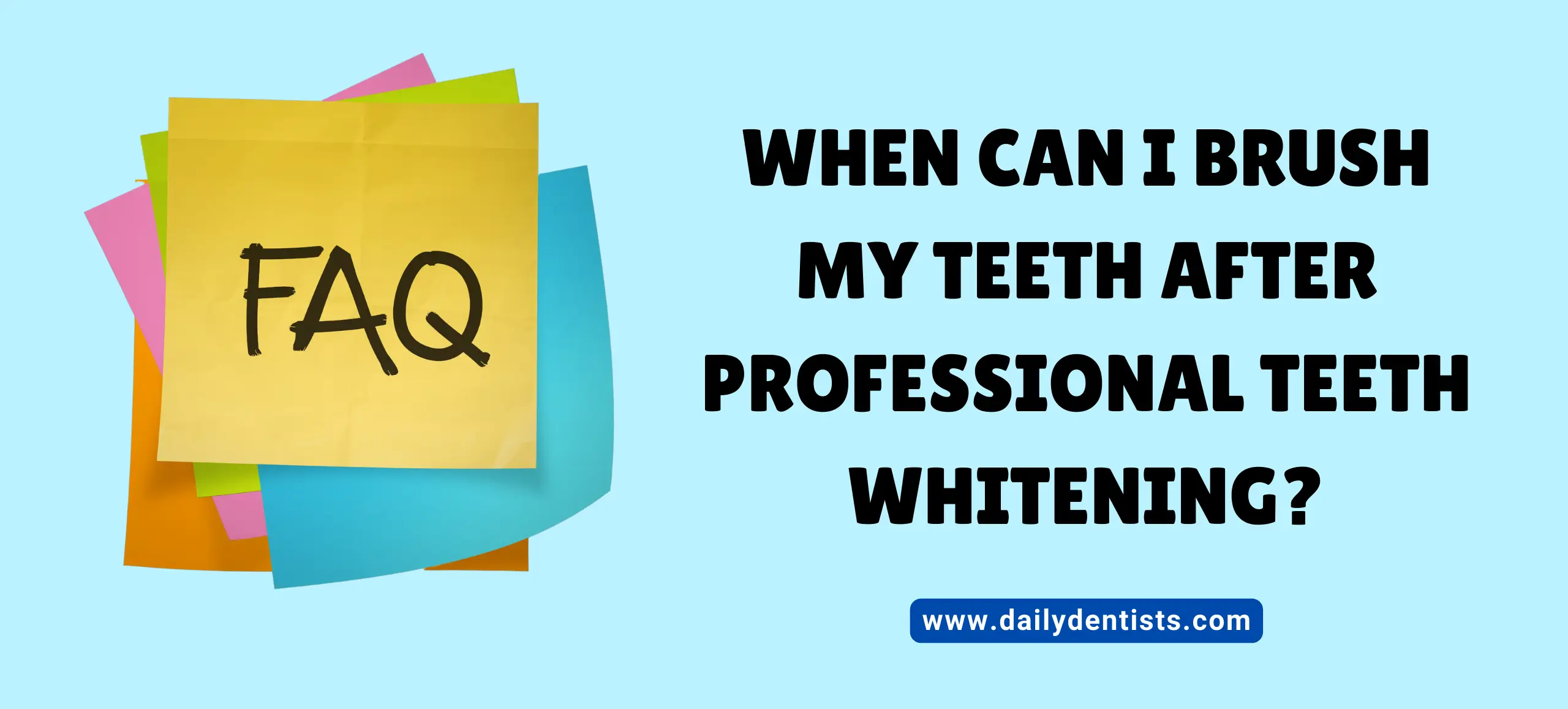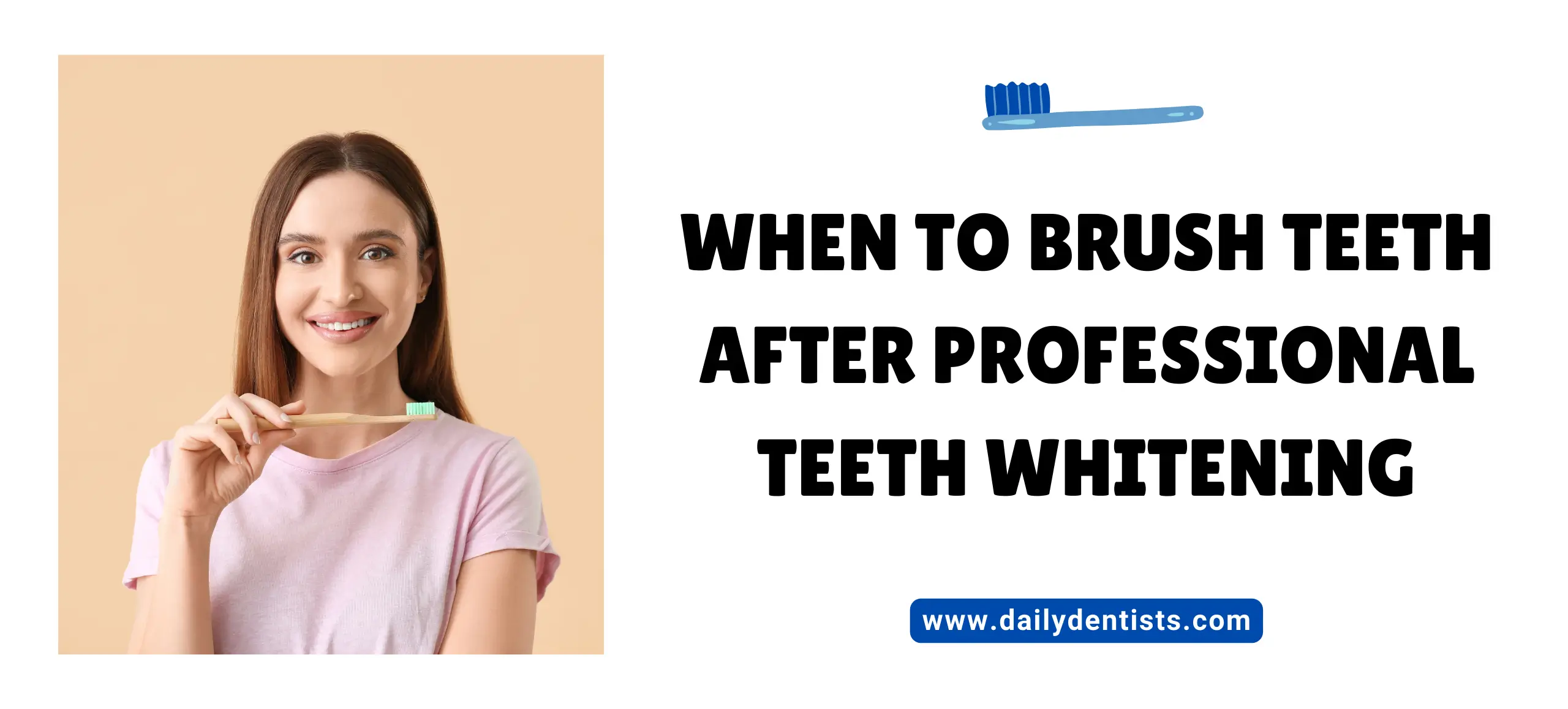Teeth whitening has become a popular cosmetic dental procedure in the United States. Teeth whitening is the best option to get a brighter smile which boosts confidence. However, to maintain those pearly whites, you must follow proper aftercare. One common question is: When should you brush your teeth after professional teeth whitening? In this article, we’ll explore when you can brush your teeth after professional teeth whitening.
Professional teeth whitening can significantly brighten your smile. But the journey to a dazzling smile doesn’t end at the dentist’s office. One crucial aspect of aftercare is knowing when and how to brush your teeth after the procedure. This article will guide you through the best practices for brushing after professional teeth whitening and offer tips for maintaining your newly whitened teeth.
What is Teeth Whitening?
This is a cosmetic dental procedure used for brightening your teeth. It works by removing stains and discoloration of your teeth. Mostly designated dentists perform teeth whitening. Teeth whitening involves strong bleaching agents compared to other over-the-counter products.
The process usually begins with a dental cleaning to remove plaque and tartar. The dentist then applies a whitening gel containing hydrogen peroxide or carbamide peroxide. A special light or laser may be used to activate the gel, enhancing its effectiveness. This whole whitening procedure takes about an hour of time. But the results you see are immediate.
Teeth whitening can address a variety of stains. These include those caused by coffee, tea, red wine, smoking, and certain medications. However, it’s important to note that teeth whitening is not permanent. The longevity of the results depends on your oral hygiene and lifestyle habits.
Things to Consider Before Teeth Whitening
Before you decide to undergo professional teeth whitening, there are a few things to consider. These factors can influence the outcome and your overall experience.
Oral Health
Ensure your teeth and gums are healthy. Whitening treatments can cause sensitivity and irritation if you have cavities, gum disease, or other dental issues. A thorough dental examination can help identify and address any problems before whitening.
Expectations
One important thing to note is that the results from teeth whitening can differ based on person to person. Factors such as the original shade of your teeth, the type of stains, and your age can affect the outcome. Discuss your expectations with your dentist to get a realistic idea of what to expect.
Sensitivity
Teeth whitening can cause temporary sensitivity. But if you are having sensitive teeth then please discuss with your dentist first before going through the process. They may recommend a desensitizing treatment before or after the procedure to minimize discomfort.
Maintenance
Consider the maintenance required to keep your teeth white after the treatment. This includes avoiding foods and drinks that can stain your teeth and following a strict oral hygiene routine.
Cost
Professional teeth whitening can be expensive. It’s important to weigh the cost against the benefits and consider your budget. Some dental insurance plans may cover a portion of the cost, so check with your provider.
Brushing After Teeth Whitening
Brushing your teeth after professional teeth whitening requires special care. Immediately after the procedure, your teeth may be more porous and sensitive. This makes them more susceptible to staining and damage. Here’s a guide on when and how to brush your teeth after whitening.
Immediate Aftercare
After the whitening procedure, your dentist will give you specific aftercare instructions. Follow them carefully. Generally, you should avoid brushing your teeth immediately after the treatment. The bleaching agents can leave your teeth temporarily more porous and sensitive. Brushing too soon can cause discomfort and increase the risk of enamel erosion.
First 24 Hours
In the first 24 hours after whitening, avoid everything from foods to drinks that may stain your teeth. These include coffee, tea, red wine, soda, berries, and sauces. Stick to a white diet, which includes foods like chicken, rice, pasta, and potatoes. Drink plenty of water to stay hydrated and help rinse away any potential staining agents.
You can brush your teeth gently before bed on the first day. Use a soft-bristled toothbrush and a toothpaste for sensitive teeth. Avoid abrasive toothpaste, as it can damage the enamel.
After 24 Hours
After the first 24 hours, you can resume your normal brushing routine. Continue using a soft-bristled toothbrush and a toothpaste for sensitive teeth. Brush your teeth twice a day for two minutes each time. Be gentle to avoid damaging the enamel.
Flossing is also important to remove food particles and plaque between your teeth. Do this once a day, but be gentle to avoid irritating your gums.
Long-Term Care
To maintain your whitened teeth, continue with good oral hygiene practices. Brush and floss daily, and visit your dentist for regular cleanings and check-ups. Don’t drink or eat such foods and drinks that will cause stains or discoloration on your teeth. If you do consume them, rinse your mouth with water afterward and brush your teeth when possible.
Teeth Whitening Aftercare Tips
Proper aftercare is crucial to maintaining your bright smile. Here are some tips to help you care for your teeth after professional whitening.
Avoid Staining Foods and Drinks
As mentioned earlier, avoid foods and drinks that can stain your teeth, especially in the first 24-48 hours after whitening. These include coffee, tea, red wine, soda, berries, and sauces. If you still want to drink these drinks then make sure to use a straw and rinse your mouth afterward.
Use a Soft-Bristled Toothbrush
As the name suggests the soft-bristled toothbrushes are gentle on your teeth and gums. It helps prevent enamel erosion and reduces the risk of sensitivity. Remember toreplace your toothbrush every two-three months or sooner if the bristles become frayed.
Choose the Right Toothpaste
Use a toothpaste designed for sensitive teeth. These toothpastes contain ingredients that help reduce sensitivity and protect your enamel. Avoid abrasive toothpaste, as it can damage the enamel and increase sensitivity.
Stay Hydrated
Drink plenty of water throughout the day. Water helps rinse away food particles and staining agents, keeping your mouth clean and reducing the risk of stains.
Avoid Smoking
Smoking can stain your teeth and reduce the effectiveness of whitening treatments. If you smoke, consider quitting to maintain your bright smile and improve your overall oral health.
Regular Dental Check-Ups
Visit your dentist regularly for check-ups and cleanings. Regular cleanings help remove plaque and tartar that can cause stains. Your dentist can also monitor your oral health and address any issues promptly.
Touch-Up Treatments
Over time, your teeth may start to lose their whiteness. Touch-up treatments can help maintain your bright smile. Your dentist can recommend the best schedule for touch-ups based on your needs and lifestyle.
Conclusion
Professional teeth whitening can give you a brighter, more confident smile. However, proper aftercare is essential to maintain the results and ensure oral health. Knowing when and how to brush your teeth after whitening is a crucial part of this aftercare. Follow your dentist’s instructions, avoid staining foods and drinks, and practice good oral hygiene. By taking these steps, you can enjoy a radiant smile for a long time.
Maintaining your whitened teeth requires commitment and care. With the right approach, you can preserve your bright smile and enjoy the benefits of professional teeth whitening. Remember to stay hydrated, avoid smoking, and visit your dentist regularly. These simple steps can make a significant difference in the longevity of your whitening results.
FAQs on Brushing Teeth After Professional Teeth Whitening

Should You Brush Your Teeth Before Whitening?
Yes, you should brush your teeth before whitening. It is important to brush so that you get rid of food particles and other things that interfere with the ability of the whitening agent to work. Make sure to brush gently and thoroughly before applying any whitening products. Avoid using a toothpaste with fluoride right before whitening, as it can create a barrier that reduces the whitening agent’s efficacy. If you’re undergoing professional whitening, your dentist will typically clean your teeth before the procedure to ensure optimal results.
How Long Does Teeth Whitening Take to Settle?
Teeth whitening usually takes about 24 to 48 hours to settle. During this time, your teeth may be more porous and susceptible to staining. It’s crucial to avoid consuming staining foods and drinks, such as coffee, tea, red wine, and dark-colored sauces, during this period. Additionally, follow your dentist’s aftercare instructions carefully to ensure the best results. The whitening process continues to stabilize over the next few days, so maintaining good oral hygiene and being mindful of your diet can help preserve the whiteness.
When Can I Brush My Teeth After Teeth Whitening Strips?
You can brush your teeth after using teeth whitening strips, but it’s best to wait at least 30 minutes. Whitening strips contain bleaching agents that can make your teeth temporarily more sensitive. Brushing too soon can cause discomfort and potential damage to your enamel. Use a soft-bristled toothbrush and a non-abrasive toothpaste designed for sensitive teeth. This helps minimize irritation and protects your enamel. If you experience significant sensitivity, consider using a toothpaste specifically formulated for sensitive teeth.
Can I Brush My Teeth After ZOOM Whitening?
Yes, you can brush your teeth after ZOOM whitening, but it’s recommended to wait until the next morning. ZOOM whitening can make your teeth more sensitive immediately after the procedure. Waiting a few hours before brushing helps avoid irritation and allows the whitening agents to fully penetrate the enamel. When you brush, use a soft-bristled toothbrush and a toothpaste for sensitive teeth to minimize discomfort. Additionally, follow your dentist’s aftercare instructions to maintain the results and ensure the longevity of your whitening treatment.

